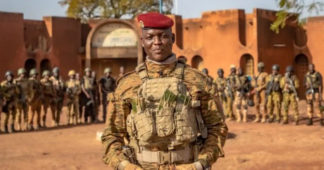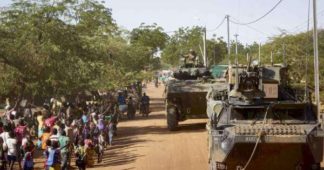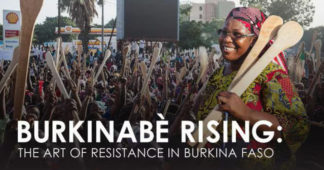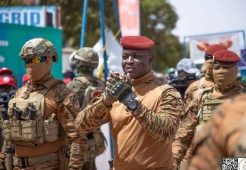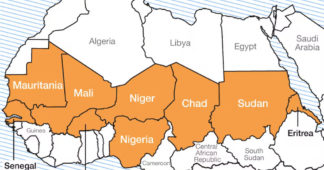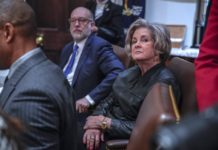by Nicholas Mwangi
Apr 30, 2025
Recent aggression against the Sahel countries saw thousands across Africa rally in solidarity with Burkina Faso and Captain Ibrahim Traoré, denouncing foreign interference and imperialist destabilization.
Thousands of Africans across the continent rallied today under the unified call of “Hands Off the AES!” to express their solidarity with Burkina Faso and its revolutionary leader, Captain Ibrahim Traoré. Demonstrations were held in Burkina Faso, Ghana, and Liberia, led by grassroots organizations and people’s movements. Protesters strongly condemned foreign interference and affirmed their support for the country’s resistance against imperialist destabilization.
Solidarity grows amid coup attempt
This continental wave of solidarity follows recent revelations by Burkina Faso’s military authorities that they had foiled a major coup attempt on April 21. The government described the plot as an effort to “sow total chaos” and reverse the country’s sovereign and revolutionary path under Traoré’s leadership.
“Under Captain Traoré, Burkina Faso has become a symbol of African dignity and resistance,” said the Socialist Movement of Ghana which co-organized the solidarity protest in Ghana. “We stand with the people of Burkina Faso who are fighting to reclaim their wealth and future from the clutches of neocolonialism.”
In Ouagadougou, the capital of Burkina Faso, hundreds gathered in Nation Square waving Burkinabe flags in solidarity with their leader.
The SMG’s statement, strongly condemned what it called “acts of destabilization and assassination that reactionary forces have perpetuated” and global powers attempting to return Burkina Faso and other Alliance of Sahel States (AES) countries “to the humiliating control of France, the US and their NATO allies.”
The AES, a newly formed regional alliance between Burkina Faso, Mali, and Niger has emerged as a symbol of West African resistance against neocolonialism. The alliance was formed after all three nations expelled French troops and ended military cooperation with former colonial powers.
US escalates pressure on AES
Adding fuel to the regional tension was the controversial statement by the US AFRICOM Commander General Michael Langley before the US Senate on April 3. Langley accused Captain Traoré of misusing the country’s gold reserves for personal protection. The general’s claims, paired with his recent visit to Côte d’Ivoire, an AES neighbor accused of sheltering coup plotters, have sparked outrage. Blaise Compaoré, the man widely condemned for betraying and orchestrating the assassination of revolutionary leader Thomas Sankara in 1987, continues to live in exile in Côte d’Ivoire under the protection of the Ivorian government.
“Langley demonizing Captain Traoré is a clear case of ‘give the dog a bad name and hang it,’” SMG said, comparing the current smear campaign to past Western tactics used to justify regime change in countries like Libya, Iraq, and even Ghana.
The statement also linked the current destabilization efforts to a long history of Western attacks on independent African leaders: “Patrice Lumumba, Kwame Nkrumah, Amílcar Cabral, Thomas Sankara…Their only crime was to insist that their countries’ natural resources serve their people,” it read.
A revolutionary path forward for Burkina Faso and the Sahel
Under Traoré, Burkina Faso has expelled French military forces, terminated exploitative agreements, rejected the CFA Franc, and redirected national wealth to grassroots development, including education, healthcare, and food security – all while facing illegal sanctions and external pressure.
The SMG called on all Pan-Africanists and progressive forces to:
- Condemn the coup attempt and foreign interference
- Organize anti-imperialist demonstrations
- Demand accountability from Côte d’Ivoire for hosting alleged coup plotters
- Urge the African Union and ECOWAS to defend Burkina Faso’s sovereignty
What is unfolding in the Sahel today represents a growing wind of change sweeping across Africa. This rising tide of defiance is an affirmation of African agency, pride, and the right to build systems that reflect the values, histories, and aspirations of its people.
We remind our readers that publication of articles on our site does not mean that we agree with what is written. Our policy is to publish anything which we consider of interest, so as to assist our readers in forming their opinions. Sometimes we even publish articles with which we totally disagree, since we believe it is important for our readers to be informed on as wide a spectrum of views as possible.
